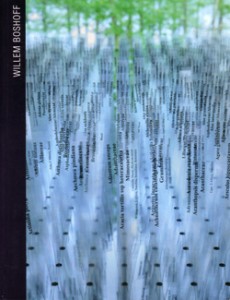Willem Boshoff possesses the instincts of the collector, the playfulness of the prankster, and the attention to detail of the scientist. His knowledge of wood and plant species (he is a self-taught and highly regarded dendrologist) is an extension of a long-held fascination with words and language, with encryption, secret writing, taxonomies, and codes. These interests and sources of inspiration have resulted in works of profound importance such as The Blind Alphabet, which was a highlight of the first Johannesburg Biennale. Other works, like 370-Day Project, Tafelboek, the Dictionary of Perplexing English, and his monumental pieces in stone such as Kring van Kennis and Windfall are remarkable as much for their complexity of structure as their exploration of ideas and their challenges to accepted notions of aesthetic possibility.
The book includes over 100 colour images of Boshoff’s work, from his earliest woodcarvings and concrete poems, to more recent works in stone, wood, and other media. An extensive and carefully researched essay by the award-winning writer Ivan Vladislavic´ places Boshoff’s art in context and offers insightful and sensitive analyses of several major works.
Willem Boshoff’s work has been exhibited internationally since the 1980s. He has completed several important commissions and his awards include the FNB Vita Award and the Helgard Steyn Award for Sculpture.
Ivan Vladislavic´ is a writer and editor and has published five books of fiction, including The Restless Supermarket and the critically acclaimed The Exploded View.
Philippa Hobbs is the author for the educational supplement published with TAXI-011 Willem Boshoff.
EXTRACT FROM THE BOOK
Between the Lines
Willem Boshoff’s Abamfusa Lawula/The Purple Shall Govern (1997) is a tightly packed wall of political slogans and chants from the struggle against apartheid, a total of forty-nine phrases in 10 pica capitals. The slogans are in various indigenous languages. Between the lines, written within the writing, translations of the slogans are given in tiny letters. These explanations, invisible from two or three metres away, are in English.1
With its combination of shouted slogan and whispered commentary, the work profiles and processes its own viewers. Those familiar with the languages of the slogans (and they are generally black) stand at a distance, reacting with amusement, recognition, alarm. Those whose ignorance excludes them from the bigger picture (and they are generally white) approach the work, until their noses are almost pressed up against it, and read the small print.
In another work from the same year, The Writing That Fell off the Wall, words printed on white blocks lie scattered on the gallery floor. A wisecrack then, not the writing on the wall but the writing that fell off it. Waarheid … Ordnung … Razno … Meany, meany, tickle a parson. Fallen language. The grand abstractions of the Enlightenment come down to earth with a bump. The fallen terms, in seven European languages, hold your attention for a spell, but the sheer profusion is discouraging. Principio … Salvation … Purité … Identität … Grens … Perfección … Wandering through this rubble of meaning, your eye snagged by one term after another, you might be gripped by a disconcerting sensation, as I was. You are standing in a ruined book. The walls are pages that have been rattled until their printed contents came tumbling down. The work is a book writ large.
The viewer of Willem Boshoff’s art is better understood as a reader. Boshoff is a writer. Not only is much of his sculpture and installation centrally concerned with language and books, but he has also written concrete poetry and dictionaries, and extended commentaries on his own work and processes. The borders between these writings are porous and their meanings seep through and run together. All of them might be regarded as passages in a discontinuous text. For three decades, he has been researching, writing and annotating a long shelf of books.
DETAILS OF BOOK
Soft-cover, 20×25 cm, 127 Pages
Author: Ivan Vladislavic
ISBN: 0 9584860 1 8
© The authors, the artist, and David Krut Publishing, 2005
ENQUIRIES
TAXI-011: Willem Boshoff, available through David Krut Publishing

